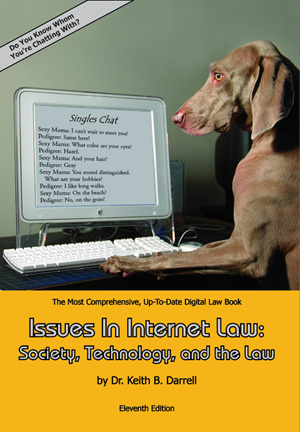| Ficker
v. Tuohy
District of Maryland
Case No. AW-04-436
February 26, 2004
Memorandum Opinion
Plaintiff Robin K.A. Ficker has filed suit against Defendants
John Tuohy and John Does 1-10 alleging that Defendants’ purchase
and use of the domain name “robinficker.com” constitute: (1)
violations of the Anti-cybersquatting Consumer Protection Act (“ACPA”);
(2) violations of the Lanham Act; (3) common-law misappropriation of the
right of publicity; and (4) common-law misappropriation, infringement,
and unfair competition. Pending before this Court is Plaintiff’s
Motion for Temporary Restraining Order [2]. In particular, Plaintiff has
requested that the Court issue an Order restraining Defendants from using
or displaying any and all websites using the domain name “robinficker.com”
or any domain name confusingly similar thereto. On February 26, 2004,
the Court conducted a conference call with Plaintiff Ficker and Counsel
for Defendant Tuohy. Upon consideration of the briefs filed in support
of and in opposition to the motion, as well as the parties’ arguments
during the conference call, the Court will DENY Plaintiff’s motion
for a temporary restraining order.
I. Factual Background
Plaintiff is an attorney practicing in Montgomery County, Maryland, who
is presently a candidate for the Republican nomination for election to
the 8th Congressional District of Maryland. Mr. Ficker owns the domain
name “robinficker2004.com”, which houses his campaign website.
According to Plaintiff, Defendant Tuohy owns the domain name “robinficker.com”.
The website currently provides summaries of disparaging news stories related
to Mr. Ficker.
Plaintiff’s Complaint requests relief on the following counts:
Count I: Cybersquatting Pursuant to 15 U.S.C. § 1125(d)
Count II: False Designation Pursuant to the Lanham Act.
15 U.S.C. § 1125(a)
Count III: Common Law Misappropriation of Right of Publicity
Count IV: Common-Law Misappropriation, Infringement, and
Unfair Competition
Plaintiff has moved this Court to issue an order temporarily
restraining Defendants from using and displaying any websites using the
domain name “robinficker.com” or any domain name similar thereto.
II. Analysis
In deciding whether to grant a motion for temporary restraining order
or preliminary injunction, the Court must consider the following four
factors:
(1) the likelihood of irreparable harm to the plaintiff if the preliminary
injunction is denied,
(2) the likelihood of harm to the defendant if the requested
relief is granted,
(3) the likelihood that the plaintiff will succeed on the
merits, and
(4) the public interest.
Morning V. Hunt, 119 F.3d 254, 263 (4th Cir. 1997) (citing Direx Israel
Ltd, v. Breakthrough Medical Corp., 952 F.2d 802, 812 (4thCir. 1991) (quoting
Rum Creek Coal Sales, Inc. v. Caperton, 926 F.2d 353, 359 (4th Cir. 1991))).
The plaintiff bears the burden of proof. Manning, 119 F.3d at 263. Furthermore,
the first two factors are most important, Rum Creek Coal Sales, Inc.,
926 F.2d at 359, and “[e]mphasis on the balance of these first two
factors results in a sliding scale that demands less of a showing of likelihood
of success on the merits when the balance of hardships weighs strongly
in favor of the plaintiff, and vice versa” In re Microsoft Corporation
Antitrust Litigation, 333 F.3d 517, 526 (4th Cir. 2003).
First, after balancing the irreparable harm to Plaintiffs and the harm
to Defendants, the Court finds that the harm to Defendants clearly outweighs
the harm to Plaintiffs. Plaintiff has failed to demonstrate that he will
suffer irreparable harm if the Court denies the requested relief. The
Court notes that the website “robinficker.com” contains a
disclaimer which states as follows: “This is an unofficial cite.
It is not Robin Ficker for U.S. Congress. Robin Ficker for Congress can
be found here.” Accordingly, visitors are not misled into believing
they have accessed Mr. Ficker’s campaign website. As such, Mr. Ficker
could only be harmed by the disparaging information presented on the website,
and, as discussed in further detail below, this language implicates Defendants’
First Amendment rights to free speech. Furthermore, by entering the public
arena as a candidate for political office, he has invited comments and
critique which operates in the spirit of healthy democracy in this country.
In addition, the Court rejects Plaintiff’s contention that the website
has a commercial purpose and affects Plaintiff’s law practice –
“robinficker.com” is clearly a political website whose sole
purpose is to address concerns regarding Mr. Ficker’s Congressional
campaign. Moreover, the Court finds that the likelihood of harm to the
Defendants is significant. The Court is particularly concerned with the
threat to Defendants’ right to free speech under the First Amendment.
In addition, the Court further finds Plaintiff has failed to demonstrate
a likelihood of success on the merits of the case. The Court is not convinced,
at this point, that the ACPA provides coverage for personal names that
are not trademarked, where the websites have no commercial use. In particular,
the Court notes that the Lanham Act provides “non-commercial use
of a mark” is not actionable under section 43 of the act. Moreover,
this suits’s implication of Defendants’ First Amendment rights
is an overriding issue. The First Amendment protection of speech is a
core value of our democracy and this Court recognizes the First Amendment’s
particularly important role in political campaigns.
Finally, the Court finds that the public has an interest in the resolution
of this matter. Indeed, the public has an interest in maintaining the
fairness and integrity of the electoral process. On the other hand, the
public has an interest in preventing any encroachment on the right to
free speech under the First Amendment. As such, this public interest cuts
both in favor of and in opposition to Plaintiff’s motion.
III. Conclusion
For the reasons discussed above, this Court will deny Plaintiff’s
motion for a temporary injunction. This Court expresses no views as to
whether service has been properly effected. To the extent Plaintiff wishes
to pursue this suit, proper service is necessary – no discovery
will be issued until proper service and response have occurred.
|


